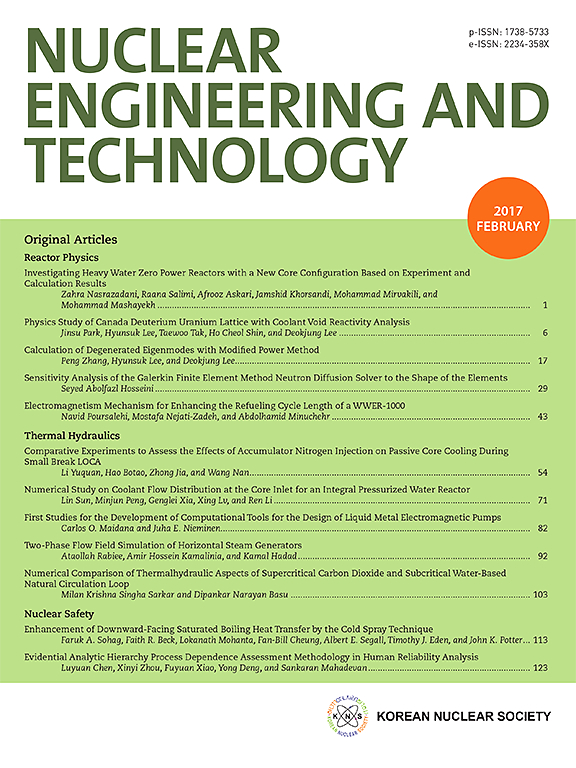利用分层固有应变的双壳结构焊接变形减小数值研究
IF 2.6
3区 工程技术
Q1 NUCLEAR SCIENCE & TECHNOLOGY
引用次数: 0
摘要
回旋加速器是进行核设备开发前沿研究和核技术创新应用的重要科学工具和不可或缺的研究平台。壳体部件采用双层厚壁结构,具有复杂的肋条和高密度全贯穿焊接接头。减轻焊接变形对回旋加速器的性能具有深远意义。厚板接头的焊接层数较多,需要分几步完成底焊、填料焊和盖焊。采用热弹性塑性方法提取了不同层的等效横向和纵向塑性应变。利用等效塑性应变可预测每层焊缝产生的焊接变形,并逐层累计总变形量。对双壳试件的焊接变形进行了数值模拟和实验研究,并详细讨论了焊接顺序和焊接夹具的设计。利用数字摄影测量系统对焊接件的变形状态进行了实时监测。测量的变形与模拟结果进行了比较。最终,试样的变形被控制在 2.64 毫米。所提出的方法可灵活评估多条焊缝中各焊接层对焊接变形的影响,为回旋加速器工程制造提供技术指导。本文章由计算机程序翻译,如有差异,请以英文原文为准。
Numerical investigation of welding deformation diminution for double shell structure using the layered inherent strain
Cyclotron is a key scientific tool and indispensable research platform for conducting cutting-edge research in nuclear equipment development as well as innovative applications of nuclear technology. The shell component has a double-layer thick-walled structure with intricate ribs and high-density, full-penetration welded joints. The mitigation of welding deformation is of profound significance to the performance of the cyclotron. The thick plate joint has many welding layers which will be divided into several steps to complete the backing, filler, and cap welding. The equivalent transverse and longitudinal plastic strains of different layers were extracted by the thermo-elastic-plastic method. The welding deformation generated by each layer of weld can be predicted by using the equivalent plastic strain, and the total distortion can be accumulated layer by layer. Numerical simulation and experimental studies were conducted on the welding deformation of the double shell specimen, and the welding sequence and design of the welding fixture were discussed in detail. The digital photogrammetry system was used to monitor the deformation state of the welded parts in real-time. The measured deformation was compared with the simulation results. Ultimately, the deformation of the specimen is controlled at 2.64 mm. The proposed method can flexibly evaluate the impact of each welding layer on welding deformation for multiple welds, which can provide technical guidance for cyclotron engineering manufacturing.
求助全文
通过发布文献求助,成功后即可免费获取论文全文。
去求助
来源期刊

Nuclear Engineering and Technology
工程技术-核科学技术
CiteScore
4.80
自引率
7.40%
发文量
431
审稿时长
3.5 months
期刊介绍:
Nuclear Engineering and Technology (NET), an international journal of the Korean Nuclear Society (KNS), publishes peer-reviewed papers on original research, ideas and developments in all areas of the field of nuclear science and technology. NET bimonthly publishes original articles, reviews, and technical notes. The journal is listed in the Science Citation Index Expanded (SCIE) of Thomson Reuters.
NET covers all fields for peaceful utilization of nuclear energy and radiation as follows:
1) Reactor Physics
2) Thermal Hydraulics
3) Nuclear Safety
4) Nuclear I&C
5) Nuclear Physics, Fusion, and Laser Technology
6) Nuclear Fuel Cycle and Radioactive Waste Management
7) Nuclear Fuel and Reactor Materials
8) Radiation Application
9) Radiation Protection
10) Nuclear Structural Analysis and Plant Management & Maintenance
11) Nuclear Policy, Economics, and Human Resource Development
 求助内容:
求助内容: 应助结果提醒方式:
应助结果提醒方式:


